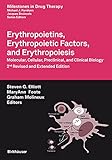Erythropoietins, Erythropoietic Factors, and Erythropoiesis : Molecular, Cellular, Preclinical, and Clinical Biology / edited by Steven G. Elliott, Mary Ann Foote, Graham Molineux.
Tipo de material: TextoSeries Milestones in Drug TherapyEditor: Basel : Birkhäuser Basel, 2009Edición: 2nd Revised and Extended EditionDescripción: recurso en líneaTipo de contenido:
TextoSeries Milestones in Drug TherapyEditor: Basel : Birkhäuser Basel, 2009Edición: 2nd Revised and Extended EditionDescripción: recurso en líneaTipo de contenido: - texto
- computadora
- recurso en línea
- 9783764386986
- RM1-950
Springer eBooks
Background -- Erythropoiesis: an overview -- Regulation of endogenous erythropoietin production -- Biology of erythropoietin -- Erythropoiesis—genetic abnormalities -- Erythropoiesis-stimulating agents -- Studies of erythropoiesis and the discovery and cloning of recombinant human erythropoietin -- Commercial production of recombinant erythropoietins -- Biosimilar epoetins -- New molecules and formulations -- Erythropoietin receptor -- Structural basis for the signal transduction of erythropoietin -- Intracellular signaling by the erythropoietin receptor -- Mechanism of erythropoietin receptor activation -- Clinical utility -- Pharmacokinetics of erythropoiesis-stimulating agents -- Use of erythropoietic stimulating agents in the setting of renal disease -- Abuse of recombinant erythropoietins and blood products by athletes -- Role and regulation of iron metabolism in erythropoiesis and disease -- Nonhematopoietic effects of erythropoiesis-stimulating agents.
This second edition is a one-source guide to current information about red blood cell physiology and the action of native and recombinant human erythropoietic factors. Topics in the fields of erythropoiesis, recombinant protein discovery and production, and treatment of patients with anemia due to renal failure, cancer, or chronic diseases are covered. The newest theories in erythropoiesis (receptors, signaling), manufacturing, new formulations, and clinical research are discussed. This book is of interest to researchers and clinical investigators in academia and biotechnology and pharmaceutical companies, to clinical research associates, clinical monitors, and physician investigators.
Para consulta fuera de la UANL se requiere clave de acceso remoto.


